$175,000 Mortgage Payment Breakdown – US Rates
Are you a homeowner in the United States looking for a comprehensive breakdown of a $175,000 mortgage payment? Understanding the components that make up your monthly mortgage payment is crucial for effective financial planning. In this article, we will delve into the details of mortgage payments, including interest rates, payment options, and total interest paid. We will also explore tools such as a mortgage payment calculator to help you determine the monthly payment amount that suits your budget.
Key Takeaways:
- The mortgage payment on a $175,000 loan includes various components such as principal, interest, taxes, and insurance.
- Understanding the formula and calculations used to determine mortgage payments is essential for financial planning.
- Interest rates play a significant role in determining the monthly payment amount.
- Considering different payment options and schedules can help align your mortgage payments with your financial situation and goals.
- Factors like the loan amount and down payment size can impact the monthly mortgage payment.
Understanding Mortgage Payments
When it comes to homeownership, understanding how mortgage payments are calculated is crucial. By knowing the mortgage payment formula and how to calculate mortgage payments, homeowners can effectively budget and plan for their monthly expenses. Let’s dive into the details.
The Mortgage Payment Formula
The formula used to calculate mortgage payments is a balance between the principal amount borrowed, the interest rate, and the length of the loan. The most common formula is the amortization formula, which breaks down the payment into principal and interest components.
“The mortgage payment formula allows homeowners to determine the exact amount they need to pay each month to repay their loan over the agreed-upon term.”
Here is the mortgage payment formula:
| Symbol | Definition |
|---|---|
| P | Principal amount borrowed |
| r | Monthly interest rate |
| n | Total number of payments |
Using this information, the formula can be expressed as:
Monthly Payment = P * r * (1 + r)^n / [(1 + r)^n – 1]
By plugging in the appropriate values for P, r, and n, homeowners can easily calculate their monthly mortgage payment down to the exact dollar amount.
Planning for Mortgage Payments
Understanding how to calculate mortgage payments empowers homeowners to plan their budget effectively. By knowing the exact amount they need to pay each month, homeowners can allocate the necessary funds, ensuring their mortgage payments are made on time.
Additionally, knowing the mortgage payment formula allows homeowners to explore different scenarios. They can calculate the impact of making extra payments, adjusting the loan term, or refinancing at a different interest rate. These calculations help homeowners make informed decisions that suit their financial goals and potentially save them money in the long run.
Now that we’ve covered the basics of understanding mortgage payments and the mortgage payment formula, let’s delve into the relationship between interest rates and mortgage payments in the next section.
Interest Rates and Mortgage Payments
One of the key factors that can significantly impact your mortgage payments is the interest rate. Understanding how interest rates work and their correlation with mortgage payments is crucial for homeowners to determine the affordability of their mortgage.
When it comes to mortgages, two types of interest rates are commonly used: fixed-rate and adjustable-rate. A fixed-rate mortgage, as the name suggests, has an interest rate that remains constant throughout the loan term, providing stability and predictability in monthly payments.
A fixed-rate mortgage payment is divided into two components: principal and interest. The principal amount is the actual borrowed sum, while the interest is the cost associated with borrowing the money. With a fixed-rate mortgage, your monthly payment remains the same over the entire loan term, making budgeting easier and providing security against fluctuating interest rates.
On the other hand, an adjustable-rate mortgage (ARM) has an interest rate that can change over time. ARMs typically begin with a fixed-rate period, usually lasting for a few years, after which the interest rate may adjust periodically based on market conditions.
Changes in interest rates can have a direct impact on your monthly mortgage payment. When interest rates rise, your monthly payment for an adjustable-rate mortgage can increase, potentially making it more challenging to budget and plan for your housing expenses.
Let’s take a closer look at how changes in interest rates can affect the monthly payment amount. Consider a hypothetical scenario where you have a $175,000 fixed-rate mortgage with a 30-year term and an interest rate of 4%. Using a mortgage payment calculator, you can determine your monthly payment amount:
“Monthly Payment: $836.70”
If the interest rate were to increase to 5%, your monthly payment would rise to:
“Monthly Payment: $940.47”
As you can see, even a small increase in the interest rate can lead to a significant rise in the monthly mortgage payment. On the other hand, if interest rates were to decrease, your monthly payment would decrease accordingly, potentially providing some financial relief.
It’s important to note that interest rates are influenced by various factors, including economic conditions, inflation rates, and central bank policies. Monitoring interest rate trends and working with a trusted lender can help you make informed decisions about your mortgage and take advantage of favorable rate environments.
Now that we’ve explored the relationship between interest rates and mortgage payments, the next section will delve into different payment options and schedules that homeowners can consider to manage their mortgage effectively.
| Interest Rate | Monthly Payment |
|---|---|
| 4% | $836.70 |
| 5% | $940.47 |
| 6% | $1,054.64 |
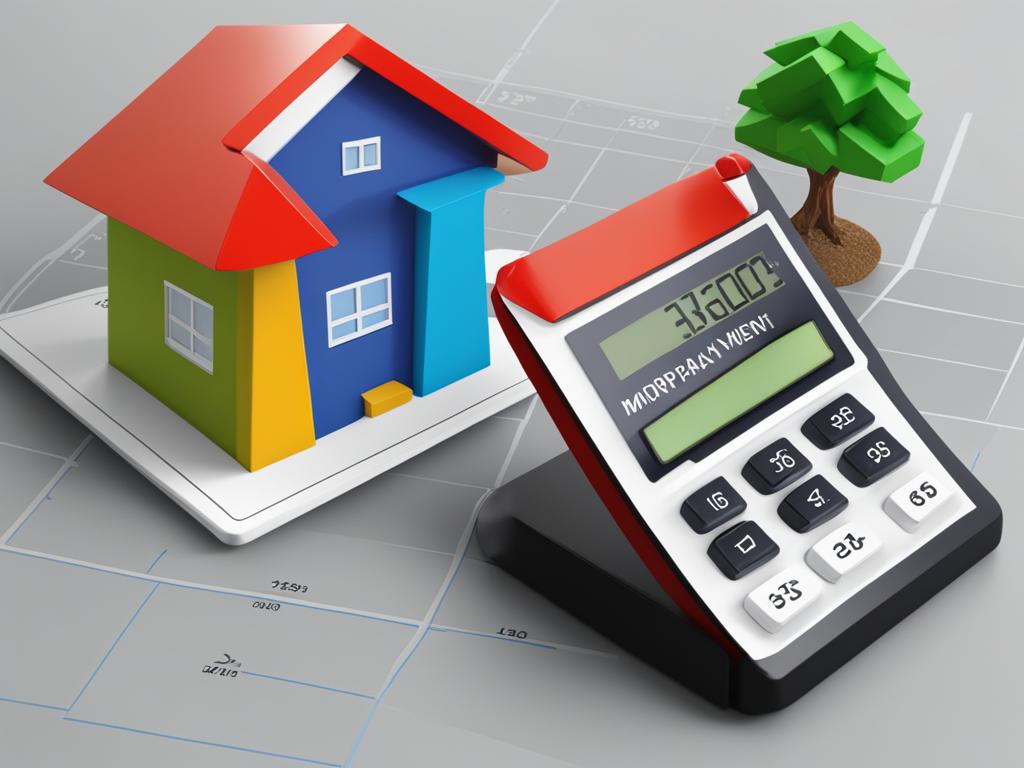
Payment Options and Schedule
When it comes to managing your mortgage payments, having options and a clear schedule can make all the difference. In this section, we will explore the different payment options available to homeowners and help you determine the best schedule for your financial needs and goals.
Payment Options
When setting up your mortgage payment plan, it’s important to consider the various options that lenders offer. Here are some common payment options:
- Monthly Payments: This is the most common payment option, where you make a fixed payment amount each month.
- Bi-Weekly Payments: With this option, you make half of your monthly payment every two weeks, resulting in 26 payments per year instead of 12.
- Accelerated Payments: This option allows you to increase your payment amount to pay off your mortgage faster and reduce the overall interest paid.
- Extra Payments: Making additional payments towards your principal can help you pay off your mortgage sooner.
Each payment option has its advantages and considerations. For example, bi-weekly payments can help you save on interest over time, while accelerated and extra payments can shorten the life of your loan. It’s essential to evaluate your financial situation and determine which option aligns best with your goals.
Payment Schedule
In addition to payment options, it’s crucial to establish a payment schedule that works for you. A mortgage payment schedule outlines when your payments are due and how they are allocated towards principal and interest.
For a better understanding of how your payments are structured, here is an example of a mortgage payment schedule for a 30-year fixed-rate mortgage:
| Payment | Date | Amount | Principal | Interest | Total Interest | Remaining Balance |
|---|---|---|---|---|---|---|
| 1 | 01/01/2023 | $1,000 | $200 | $800 | $800 | $174,800 |
| 2 | 02/01/2023 | $1,000 | $202 | $798 | $1,598 | $174,598 |
Keep in mind that the payment schedule may vary depending on the specifics of your mortgage, such as the interest rate and loan term. This example serves as a guide to help you visualize how your payments may be distributed over time.
Understanding your payment options and having a clear schedule can empower you to make informed decisions about your mortgage payments. Whether you choose bi-weekly payments, accelerated payment plans, or make extra payments, finding the right strategy can help you manage your mortgage effectively and potentially save on interest in the long run.
Loan Amount and Down Payment
When it comes to getting a mortgage, the loan amount and down payment are two crucial factors to consider. Understanding the relationship between these two elements can help you make informed decisions about your home purchase. Let’s take a closer look at how the loan amount and down payment affect your monthly mortgage payment.
Down Payment Percentages for Different Home Prices
In general, a down payment is a percentage of the total purchase price that you pay upfront. The remaining amount is financed through the mortgage. The size of your down payment can vary depending on the price of the home and other factors.
Here is a breakdown of typical down payment percentages based on different home prices:
| Home Price | Down Payment Percentage |
|---|---|
| $100,000 | 20% |
| $200,000 | 15% |
| $300,000 | 10% |
Keep in mind that these percentages are just examples and can vary based on your specific circumstances and loan requirements.
Impact on Monthly Mortgage Payment
A larger down payment can have a significant impact on your monthly mortgage payment. By putting more money upfront, you reduce the loan amount and, in turn, the interest charged on that amount. This leads to a lower monthly payment. Let’s see how it works:
For example, let’s say you’re considering a $200,000 home and have two down payment options: 10% ($20,000) and 20% ($40,000). With a 30-year fixed-rate mortgage at an interest rate of 4.5%, your estimated monthly mortgage payments would be as follows:
- 10% down payment: $1,013.37
- 20% down payment: $898.09
As you can see from the example above, a larger down payment results in a lower monthly mortgage payment. This can help you save money over the life of the loan and make your monthly budget more manageable.
It’s important to note that a higher down payment may not always be feasible for everyone. You should carefully consider your financial situation, future goals, and discuss your options with a mortgage lender to determine the best down payment amount for you.
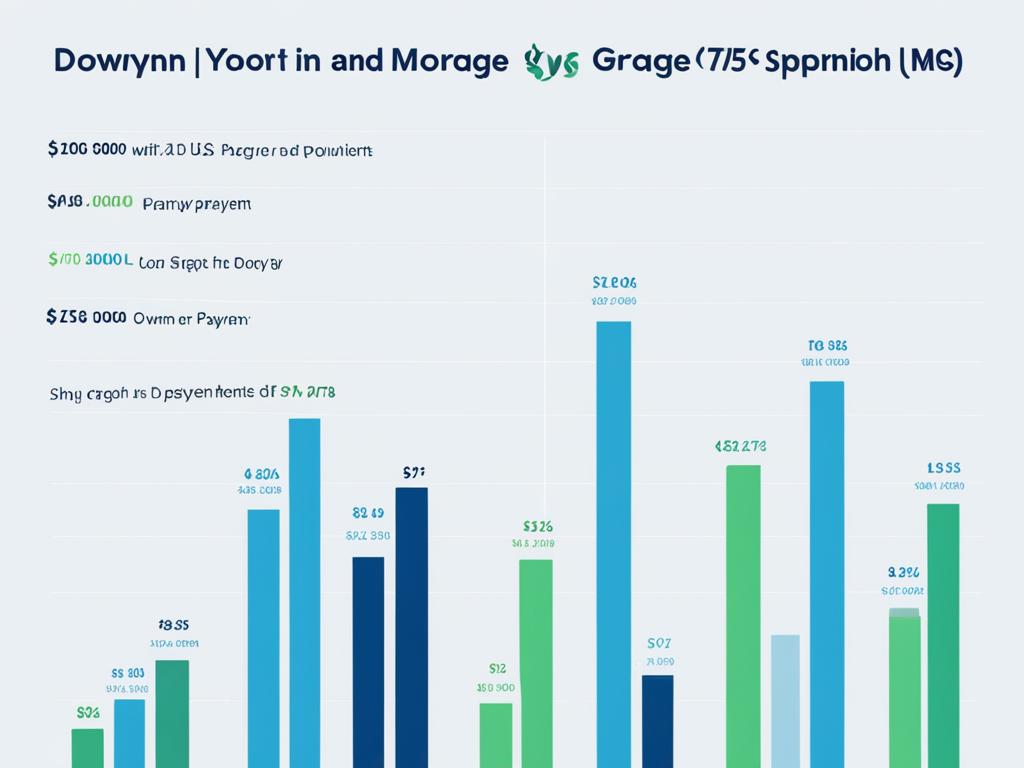
In the next section, we will compare different mortgage options based on loan payoff length and interest rates. This will give you a better understanding of how these factors impact your monthly payments and overall financial picture.
Mortgage Comparisons
When considering a mortgage, it’s important to compare different options to find the best fit for your financial goals. In this section, we will compare mortgage options based on loan payoff length and interest rates, providing you with valuable insights to make an informed decision.
Loan payoff length is a crucial factor in determining the total cost of your mortgage. A shorter loan payoff length may result in higher monthly payments, but it can save you a significant amount of money in interest over the life of the loan. On the other hand, a longer loan payoff length can lower your monthly payments but may result in higher total interest paid.
Let’s take a closer look at how the loan payoff length affects monthly payments. Consider the following example comparing two mortgages:
| Loan Amount | Interest Rate | Loan Payoff Length | Monthly Payment | |
|---|---|---|---|---|
| Mortgage A | $200,000 | 3.5% | 30 years | $898.09 |
| Mortgage B | $200,000 | 3.5% | 15 years | $1,430.52 |
In this example, Mortgage A has a loan payoff length of 30 years, resulting in a lower monthly payment of $898.09. On the other hand, Mortgage B has a loan payoff length of 15 years, leading to a higher monthly payment of $1,430.52. Although Mortgage B requires larger monthly payments, it allows for a faster payoff and significantly less interest paid over time.
It is important to note that interest rates also play a crucial role in determining monthly payments. Lower interest rates can result in lower monthly payments, regardless of the loan payoff length. Therefore, it’s essential to compare mortgage options with different interest rates to identify potential savings.
Here’s an example comparing the same mortgage with different interest rates:
| Loan Amount | Interest Rate | Loan Payoff Length | Monthly Payment | |
|---|---|---|---|---|
| Mortgage C | $200,000 | 3.5% | 30 years | $898.09 |
| Mortgage D | $200,000 | 4% | 30 years | $954.83 |
In this example, Mortgage C with an interest rate of 3.5% has a monthly payment of $898.09. However, Mortgage D with a slightly higher interest rate of 4% has a monthly payment of $954.83. This shows that even a small change in interest rate can impact the monthly payment amount.
Considerations for Mortgage Comparisons
When comparing mortgages, it’s crucial to evaluate your individual financial situation and long-term goals. Factors to consider include:
- Your current monthly budget and affordability
- Your long-term financial plan and goals
- Your risk tolerance
- Your future earning potential
By weighing these factors and comparing mortgage options based on loan payoff length and interest rates, you can make an informed decision that aligns with your financial objectives. Remember to consult with a mortgage professional who can provide personalized guidance tailored to your specific needs.
Continue reading to understand the concept of total interest paid over the life of the mortgage and explore factors that can affect mortgage payments, including insurance and maintenance costs.
Understanding Total Interest Paid
In the process of obtaining a mortgage, it is crucial for homeowners to have a comprehensive understanding of the total interest paid over the life of the loan. Total interest paid refers to the cumulative amount of interest payments made throughout the duration of the mortgage.
This concept holds significant financial implications as it determines the overall cost of homeownership and the subsequent impact on individual budgets. By comprehending the factors that influence the total interest paid, homeowners can make informed decisions to optimize their finances.
The total interest paid is heavily dependent on the interest rate, loan term, and outstanding balance of the mortgage. Generally, a higher interest rate and longer loan term result in a higher total interest paid over time. Conversely, a lower interest rate and shorter loan term can lead to reduced interest payments.
An effective strategy for homeowners to minimize the total interest paid is to make additional payments towards the principal balance of the mortgage. By allocating extra funds towards the principal, borrowers can accelerate the loan payoff timeline and save on interest costs.
For example, let’s consider a scenario where a homeowner has a $175,000 mortgage with a fixed interest rate of 4.5% for a 30-year term. By making an extra payment of $100 each month towards the principal, the homeowner can potentially save thousands of dollars in interest and pay off the loan earlier.
| Payment Schedule | Total Interest Paid | Loan Payoff Time |
|---|---|---|
| Regular Payment | $138,989 | 30 years |
| Regular Payment + $100 Extra | $95,189 | 24 years, 10 months |
As seen in the table above, by making additional payments towards the principal each month, the homeowner saves $43,800 in interest and shortens the loan payoff time by 5 years and 2 months.
Another strategy to consider is refinancing the mortgage. Refinancing involves obtaining a new mortgage with better terms, such as a lower interest rate. This can lead to substantial savings on interest payments over the life of the loan.
For instance, let’s assume the homeowner in the example above decides to refinance their mortgage after 5 years, securing a new interest rate of 3.5% for a remaining term of 25 years. The following table illustrates the potential savings:
| Payment Schedule | Total Interest Paid | Loan Payoff Time |
|---|---|---|
| Regular Payment | $138,989 | 30 years |
| Refinanced Payment | $88,947 | 25 years |
By refinancing and obtaining a lower interest rate, the homeowner can potentially save $50,042 in interest payments and reduce the loan payoff time by 5 years.
In conclusion, understanding the concept of total interest paid is vital for homeowners to make informed financial decisions regarding their mortgage. By implementing strategies such as making additional principal payments and refinancing, homeowners can significantly reduce the total interest paid, leading to substantial savings and a shorter loan payoff time.
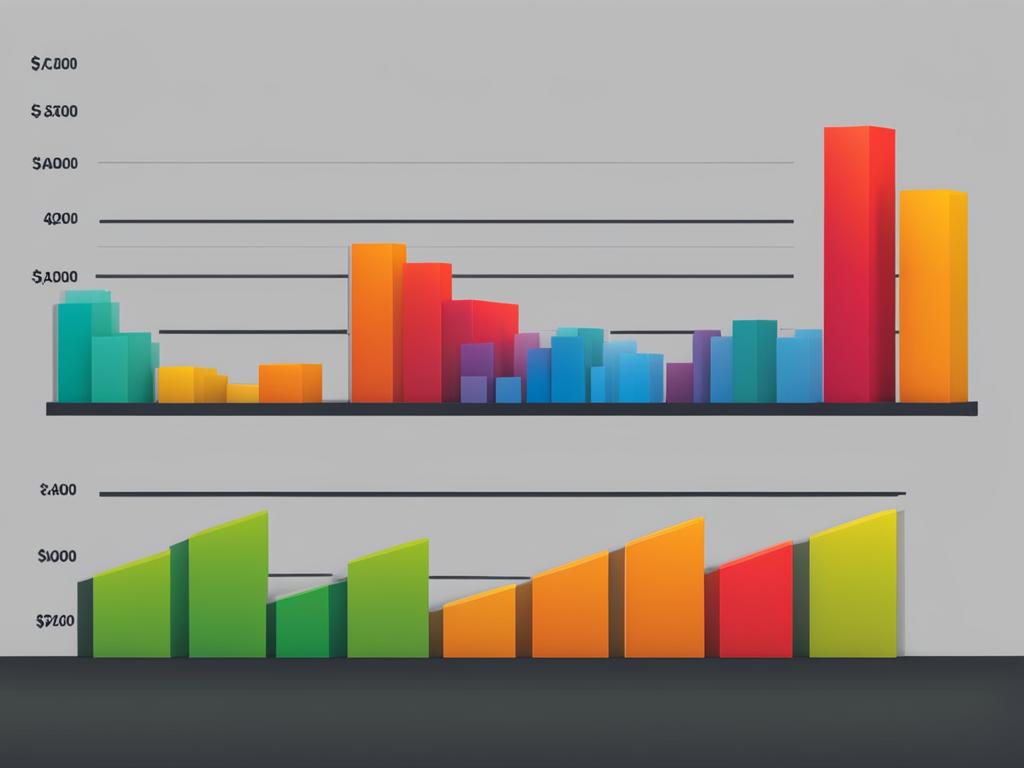
Factors Affecting Mortgage Payments
When it comes to mortgage payments, it’s not just the loan amount and interest rate that homeowners need to consider. There are several other factors that can impact the overall cost of homeownership. In this section, we will explore some of the key factors affecting mortgage payments, including insurance and maintenance costs.
Insurance Costs
One of the significant factors impacting mortgage payments is insurance. Homeowners insurance is essential for protecting your investment and ensuring financial security. The cost of insurance can vary depending on factors such as the location of the property, the value of the home, and the coverage options you choose.
It’s crucial to shop around for insurance providers and compare quotes to find the best coverage at the most affordable price. By doing so, homeowners can effectively manage their insurance costs and factor them into their monthly mortgage payment calculations.
Maintenance Costs
Maintenance expenses are another important consideration for homeowners. Keeping a property well-maintained is crucial for preserving its value and ensuring a comfortable living environment. However, homeowners need to be prepared for routine maintenance and unexpected repairs, both of which can impact their monthly budget.
While the specific maintenance costs can vary depending on the size and age of the property, it’s generally recommended to set aside about 1% of the home’s value annually for maintenance expenses. This can help homeowners budget for repairs and ensure they can cover the costs without financial strain.
“Maintaining a home is an ongoing responsibility that can impact your monthly budget. By setting aside funds for maintenance expenses, homeowners can ensure that their mortgage payments remain affordable while keeping their property in good condition.”
Comprehensive Understanding of Costs
By taking into account insurance and maintenance costs, homeowners can have a comprehensive understanding of the total cost of homeownership. This includes not only the mortgage payment but also the additional expenses required to maintain and protect their investment.
Understanding these additional costs is crucial for budgeting and financial planning. It enables homeowners to make informed decisions when selecting a mortgage option and ensures that they can comfortably manage their monthly payments without compromising their overall financial well-being.
| Factors Affecting Mortgage Payments | Impact |
|---|---|
| Loan Amount | Determines the principal borrowed and affects the monthly payment amount. |
| Interest Rate | Affects the overall cost of the loan and determines the monthly interest payment. |
| Insurance Costs | Additional expense that homeowners need to factor into their monthly budget. |
| Maintenance Costs | Regular and unexpected expenses that impact the overall affordability of homeownership. |
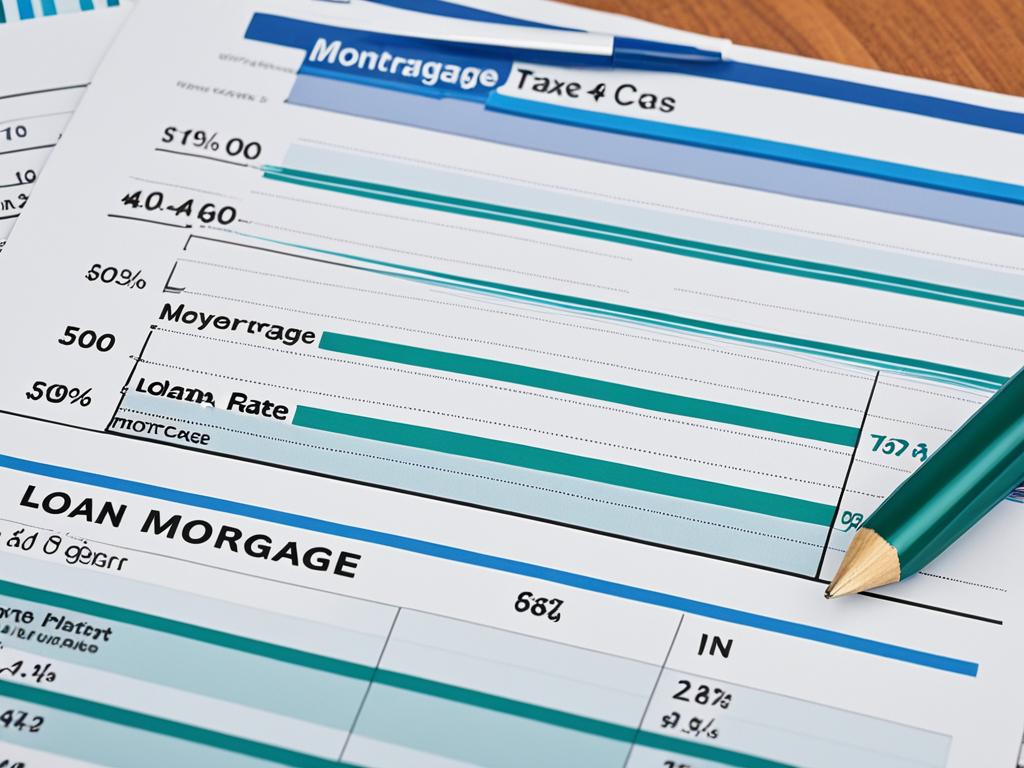
Early Payoff Options
Paying off a mortgage early can provide numerous financial benefits and give homeowners peace of mind. By reducing the loan term and interest paid, individuals can save substantial amounts of money and achieve financial freedom sooner. However, before pursuing an early mortgage payoff, it is important to consider the following factors:
- Financial Stability: Before committing to an early mortgage payoff, homeowners should ensure they have sufficient emergency savings and are meeting other financial obligations. It is essential to maintain a stable financial foundation while prioritizing mortgage repayment.
- Interest Savings: One of the primary advantages of paying off a mortgage early is the potential for significant interest savings. By minimizing the loan term, homeowners can reduce the total interest paid over the life of the mortgage. This can result in substantial long-term savings and increase overall financial flexibility.
- Mortgage Prepayment Penalties: Some mortgages may impose prepayment penalties for paying off the loan before the agreed-upon term. Homeowners should carefully review their mortgage agreement to determine if any penalties apply. If prepayment penalties exist, they should be factored into the decision-making process.
- Opportunity Costs: While paying off a mortgage early can provide financial security, it also ties up funds that could be used for other purposes such as investments, retirement savings, or higher-yielding opportunities. Homeowners should assess their individual financial goals and consider the potential opportunity costs associated with an early mortgage payoff.
To accelerate the mortgage paydown process, homeowners can employ a few strategies:
- Increasing monthly payments: By paying extra toward the principal each month, homeowners can significantly reduce the overall loan term and save on interest charges.
- Bi-weekly payments: Switching to bi-weekly mortgage payments instead of monthly payments can result in an extra month’s payment each year, reducing the loan term.
- Refinancing to a shorter term: Homeowners who can afford higher monthly payments may choose to refinance their mortgage to a shorter term, allowing them to pay off their loan sooner and save on interest.
- Utilizing windfalls: Applying unexpected financial windfalls such as bonuses, tax refunds, or inheritance toward mortgage principal can make a significant impact on the loan balance.
Considering the potential benefits and weighing the associated factors will help homeowners make an informed decision regarding early mortgage payoff. It is advisable to consult with a financial advisor or mortgage professional to assess individual circumstances and determine the most appropriate course of action.
In the words of renowned investor Warren Buffett:
“Getting rid of debt is a great investment… There is nothing better than being debt-free. It gives you freedom.”

Refinancing and Mortgage Payments
Refinancing your mortgage can have a significant impact on your monthly payments. By obtaining a new loan with a lower interest rate, homeowners can potentially reduce their monthly mortgage payment amount.
When you refinance your mortgage, you essentially replace your existing loan with a new one that offers more favorable terms. One of the primary reasons homeowners choose to refinance is to take advantage of lower interest rates available in the market.
By refinancing at a lower interest rate, you can decrease the overall cost of your mortgage, resulting in a reduction in your monthly payments. This can provide you with additional financial flexibility and potentially free up more funds for other expenses or savings.
It’s essential to consider the costs associated with refinancing, such as closing costs and fees. These expenses can vary depending on your lender and loan terms. However, even with these costs, refinancing can still be advantageous if the potential savings outweigh the upfront expenses.
If you’re considering refinancing, it’s crucial to evaluate your current mortgage terms and compare them to the potential benefits of refinancing. Utilize a mortgage calculator to estimate your new monthly payment based on different interest rates and loan terms.
Keep in mind that while refinancing can lower your monthly payment, it can also extend the length of your loan. If your goal is to pay off your mortgage early, you may want to consider shortening the term of your new loan when refinancing.
Before making a decision, it’s advisable to consult with a mortgage professional who can help you understand the potential savings and financial implications of refinancing. They can provide personalized guidance based on your unique financial situation and goals.

Budgeting for Mortgage Payments
When it comes to managing your mortgage payments, effective budgeting is key. By creating a comprehensive financial plan that takes into account your mortgage payment obligations, you can ensure that your payments are manageable and aligned with your overall financial goals.
Here are some practical tips and strategies to help you budget effectively for your mortgage payments:
- Evaluate your current financial situation: Take stock of your income, expenses, and existing debt. This will give you a clear picture of how much you can afford to allocate towards your mortgage payments.
- Calculate your mortgage payment: Use a mortgage payment calculator to determine the exact amount you’ll need to set aside each month. This will help you establish a baseline for your budgeting efforts.
- Consider your other financial goals: Take into account your short-term and long-term financial goals, such as saving for retirement, education, or emergencies. Allocate a portion of your budget towards these goals while ensuring that your mortgage payments remain a priority.
- Plan for unexpected expenses: Set aside some funds for unforeseen expenses, such as home repairs or medical emergencies. This will help you avoid dipping into your mortgage payment budget in case of emergencies.
- Explore refinancing options: If you find that your current mortgage payments are straining your budget, consider refinancing your loan. Lowering your interest rate can help reduce your monthly payments and free up some additional funds.
- Create a monthly budget: Track your income and expenses and create a detailed monthly budget. Allocate a specific amount towards your mortgage payments and make sure to stick to it diligently.
- Review and adjust your budget regularly: As your financial situation evolves, make it a habit to review and adjust your budget accordingly. This will ensure that your mortgage payments remain manageable and aligned with your changing circumstances.
By implementing these budgeting strategies, you can confidently manage your mortgage payments and maintain financial stability. Remember, effective budgeting is an important component of successful homeownership.
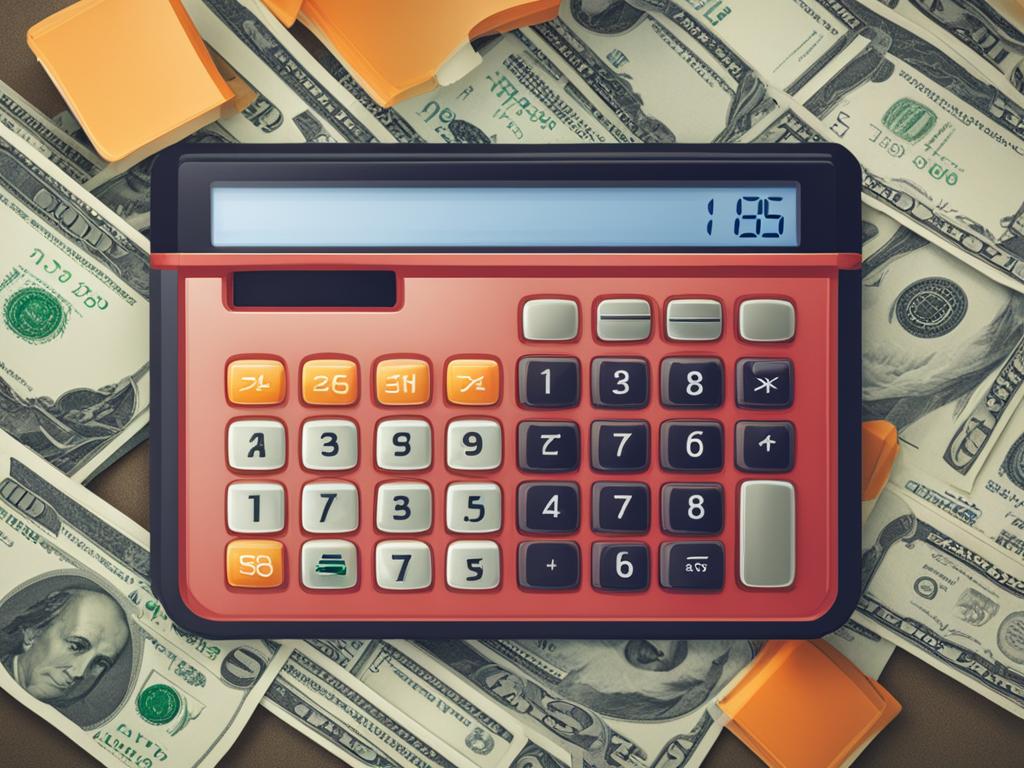
Conclusion
In conclusion, understanding the breakdown of a $175,000 mortgage payment is essential for US homeowners. By carefully considering factors such as interest rates, payment options, and total interest paid, homeowners can make informed decisions about their mortgage payments, resulting in greater financial stability.
By utilizing mortgage payment calculators and understanding how to calculate mortgage payments, homeowners can accurately budget for their monthly expenses. Moreover, being aware of the impact of interest rates on mortgage payments allows homeowners to assess affordability and plan accordingly.
Additionally, considering different payment options and schedules, as well as the relationship between loan amount and down payment, is crucial in finding the right mortgage arrangement. Homeowners should also be aware of the potential savings that can be achieved by making additional payments or refinancing their mortgage.
Furthermore, budgeting effectively for mortgage payments is key to maintaining financial stability. As homeowners evaluate their overall financial plan, it is important to factor in the total cost of home ownership beyond the mortgage amount and interest rate, including insurance and maintenance costs.
FAQ
How do I calculate my mortgage payment?
To calculate your mortgage payment, you can use a mortgage payment calculator. This tool takes into account factors such as your loan amount, interest rate, and loan term. Simply input these details, and the calculator will provide you with your monthly mortgage payment amount.
How are mortgage payments calculated?
Mortgage payments are calculated using a formula that takes into account the loan amount, interest rate, and loan term. This formula calculates the amount of each monthly payment required to pay off the loan by the end of its term.
What is a fixed-rate mortgage?
A fixed-rate mortgage is a type of mortgage where the interest rate remains constant for the entire loan term. This means that your monthly mortgage payment will stay the same throughout the duration of your loan.
How does the interest rate affect my mortgage payment?
The interest rate on your mortgage can significantly impact your monthly payment amount. A higher interest rate will result in a higher monthly payment, while a lower interest rate will result in a lower monthly payment.
What are my payment options and schedule?
Homeowners have various payment options and schedules to choose from. These include monthly, bi-weekly, or accelerated payment plans. Each option has its own benefits and drawbacks, so it’s important to select the one that best fits your financial situation and goals.
How does the loan amount and down payment affect my mortgage payment?
The loan amount and down payment can impact your mortgage payment in several ways. A larger loan amount will typically result in a higher monthly payment. Conversely, a larger down payment can lower your monthly payment by reducing the loan amount.
How do different mortgage options compare based on loan payoff length and interest rates?
Mortgage options can vary based on the length of the loan and the interest rate. Generally, shorter loan terms and lower interest rates result in higher monthly payments but lower overall interest paid. Longer terms and higher interest rates can lower the monthly payment but increase the total interest paid over the life of the loan.
How does the total interest paid over the life of the mortgage affect my payment?
The total interest paid over the life of the mortgage can have a significant impact on your payment. By making additional payments or refinancing, you may be able to reduce the total interest paid and potentially lower your monthly payment.
What factors can impact my mortgage payment beyond the loan amount and interest rate?
In addition to the loan amount and interest rate, several other factors can affect your mortgage payment. These can include property taxes, homeowners insurance, private mortgage insurance (PMI), and maintenance expenses. It’s important to consider these additional costs when budgeting for your mortgage payment.
What are the benefits of paying off a mortgage early?
Paying off a mortgage early can have several benefits, including saving on interest payments and achieving financial freedom sooner. By making additional payments or following a paydown strategy, you can reduce the length of your loan and potentially save thousands of dollars in interest.
How does mortgage refinancing impact my mortgage payments?
Mortgage refinancing can impact your mortgage payments by potentially lowering your interest rate. A lower interest rate can result in a lower monthly payment amount, providing you with potential savings over the life of your loan.
How can I budget effectively for my mortgage payments?
To budget effectively for your mortgage payments, it’s important to assess your overall financial situation. Consider your monthly income, expenses, and future financial goals. Develop a budget that allows for manageable mortgage payments, ensuring that they align with your long-term financial plan.

